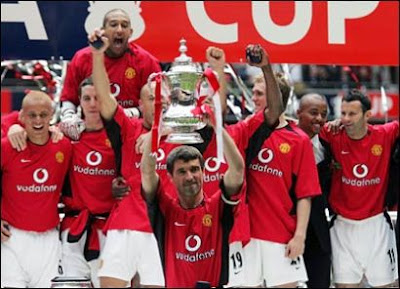 The relationship between father and son is always a special one, but for Nigel Clough the bond with his dad, Brian, could never be broken. Father and son were never less than best friends and you somehow knew that one day Nigel would do exactly; the same job as his doting dad.
The relationship between father and son is always a special one, but for Nigel Clough the bond with his dad, Brian, could never be broken. Father and son were never less than best friends and you somehow knew that one day Nigel would do exactly; the same job as his doting dad.Earlier this month, Nigel Clough became the new manager of Derby County, 42 years after Ol' Big 'Ead breezed into the old Baseball Ground. In 1967 Clough senior was an unknown, Derby were struggling at the wrong end of the old Second
 Division and a band from Liverpool were conquering the world.
Division and a band from Liverpool were conquering the world.After serving a stern 10-year apprenticeship at non-league Burton Albion, a boy called Nigel has been catapulted into the deep end at Championship club Derby County. Which is roughly where Clough senior came in. By the end of Brian Clough's career both Derby County and Nottingham Forest had become household names with trophies galore.
Brian Clough won League championships in abundance with both Derby and Forest, boasting one of the most identifiable of voices. He was forthright, opinionated, an infuriating nuisance at times but always accessible to both the public and media alike. He once called an eccentric Polish goalkeeper a clown, hollered obscenities at his players when close season training wasn't going according to plan, and in a League Cup match against QPR, lashed out at Rangers supporters.
In their Carling Cup semi-final against Manchester United last week, Nigel Clough sat quietly in the Directors Box remembering the good times with dad. In contrast to his controversial father, Nigel, it would seem, is an altogether different footballing boss. It remains to be seen whether Nigel will tell his players exactly what he thinks of them and whether cups and saucers are thrown in the dressing room.
Clough junior, apart from bearing an uncanny resemblance to Ol' Big 'Ead, is also a devoted family man. He will set out his footballing theories, put a sympathetic hug around his players when things go pear-shaped and then undoubtedly demand three points and
 the Champions League trophy
the Champions League trophyWhen he was at Burton Albion all Clough had to deal with was a postage stamp sized ground, little or no money for new players and the electricity bills. Non-league clubs are the poor relations in football's great pyramid, so when he takes his place for his first match as Derby boss the culture shock may just startle him.
He will climb into the Pride Park dug out, take in the glamorous surroundings and wonder what he's letting himself for. In the old days Derby's Baseball Ground would often resemble a gravel pit. Brian Clough would walk out on the pitch, politely applaud his adoring supporters and then watch his much revered side including John McGovern, Archie Gemmell, Kevin Hector and John O'Hare.
The task that faces son Nigel is entirely different and this time there are no European cups or League Championships on the immediate horizon. There is no Peter Taylor to confide in when the boys are under-achieving, only a reliable back room staff to hand out reassurance.
When Nigel the younger was growing up, dad Brian would often take him to to all the matches. You can still see the little boy in shorts sitting excitedly next to his dad and just smiling. True Brian Clough was a master motormouth, tactlessness personified and a man with no regard for the niceties. But he taught his players all of the game's finer virtues and he also encouraged them to treat the ball like a favourite uncle.
If Nigel Clough can make half the same impact as his monumentally successful dad then Derby County could well be back in the big time in no time. During one League encounter against Manchester City, a groundsman had to run on to the pitch to paint a penalty spot.
From the resultant penalty Derby scored. Brian Clough would have seen the funny side of that one isolated incident. If Nigel Clough can keep looking at the bright side of life then Derby County could be grinning from ear to ear.
Soccermongery's all about your feedback, so write away, right away!



 Tommy Trinder, the late comedian and one-time Fulham chairman, must have called the club's fans some of the luckiest people in the world. By the end of their 4-0 drubbing at the hands of Manchester United most of us felt enormously privileged. United were through to an FA Cup semi-final against Everton and Fulham looked like lost tourists in the middle of Piccadilly Circus.
Tommy Trinder, the late comedian and one-time Fulham chairman, must have called the club's fans some of the luckiest people in the world. By the end of their 4-0 drubbing at the hands of Manchester United most of us felt enormously privileged. United were through to an FA Cup semi-final against Everton and Fulham looked like lost tourists in the middle of Piccadilly Circus.



